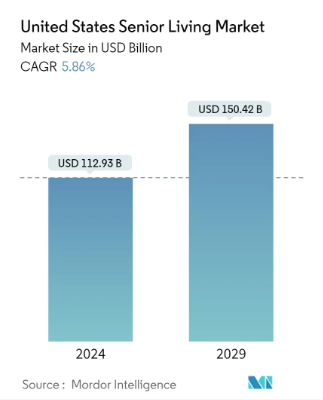Mordor Intelligence has published a new report on the United States Senior Living Market, offering a comprehensive analysis of trends, growth drivers, and future projections.
The United States senior living market is projected to grow from USD 112.93 billion in 2024 to USD 150.42 billion by 2029, exhibiting a compound annual growth rate (CAGR) of 5.86% during the forecast period. The senior living industry in the United States is undergoing a significant transformation, propelled by the aging baby boomer generation and a paradigm shift from traditional caregiving to wellness-oriented living environments. As over 10,000 individuals reach the age of 65 daily, the demand for senior housing and related services is escalating. This demographic shift is fostering the development of communities that prioritize holistic well-being, encompassing physical fitness, nutrition, mental health, and social engagement, thereby enhancing the quality of life for older adults.
Key Trends
- Emphasis on Wellness-Focused Communities: Senior living facilities are increasingly integrating wellness programs, including fitness centers, nutritional guidance, mental health services, and diverse social activities. This comprehensive approach aims to improve residents’ overall well-being and satisfaction.
- Rapid Growth of the Aging Population: The United States is experiencing a significant increase in its elderly population, particularly those over 80, whose numbers are expected to rise by nearly 50% over the next decade. This surge underscores the pressing need for expanded senior housing and care services.
- High Occupancy Rates in Senior Housing: Assisted and independent living properties are witnessing high occupancy rates, indicating robust demand. The Southeast region, in particular, hosts a substantial number of senior housing communities, reflecting regional growth patterns.
- Nonprofit Entities Achieving Higher Occupancy: Despite offering fewer amenities compared to for-profit counterparts, nonprofit senior living communities often achieve higher occupancy rates, suggesting that factors beyond amenities, such as community reputation and quality of care, play a crucial role in resident selection.
- Technological Innovations Enhancing Care: The adoption of advanced technologies, including telehealth, remote monitoring, and AI-driven health management systems, is revolutionizing senior care by improving accessibility, personalization, and efficiency of services.
Report Overview: https://www.mordorintelligence.com/industry-reports/united-states-senior-living-market
Market Segmentation
The United States senior living market is segmented by property type and key states:
- By Property Type:
- Assisted Living: Facilities providing assistance with daily activities while promoting independence.
- Independent Living: Communities designed for seniors who require minimal or no assistance, offering a lifestyle free from home maintenance responsibilities.
- Memory Care: Specialized care units catering to individuals with Alzheimer’s disease or other forms of dementia, providing a safe and supportive environment.
- Nursing Care: Facilities offering comprehensive medical care and assistance for seniors with significant health issues or disabilities.
- Other Property Types: Includes continuing care retirement communities (CCRCs) and other hybrid models that offer a continuum of care services.
- By Key States:
- New York: A significant market with a diverse range of senior living facilities catering to various income groups and care needs.
- Illinois: Home to numerous senior living communities, with growth driven by an increasing elderly population.
- California: One of the largest markets, characterized by a wide variety of senior living options and a strong emphasis on wellness and active lifestyles.
- North Carolina: Experiencing rapid growth in senior living facilities, particularly in the assisted living segment.
- Washington: Notable for its innovative senior living communities and integration of technology in senior care.
- Rest of United States: Encompasses other states with emerging markets and varying degrees of market penetration and growth potential.
Get a Customized Report Tailored to Your Requirements. – https://www.mordorintelligence.com/market-analysis/senior-living
Key Players
The United States senior living market is characterized by a mix of large national chains and regional providers. Major players include:
- Brookdale Senior Living Inc.: As one of the largest senior living operators, Brookdale offers a range of services, including independent living, assisted living, and memory care, across numerous communities nationwide.
- Five Star Senior Living: Provides a variety of senior living options, emphasizing personalized care and wellness programs to enhance residents’ quality of life.
- Sunrise Senior Living: Focuses on providing high-quality assisted living and memory care services, with a commitment to individualized care and resident-centered services.
- Holiday Retirement: Specializes in independent living communities, offering seniors a maintenance-free lifestyle with a focus on social engagement and activities.
- Kisco Senior Living Company: Operates a portfolio of senior living communities that provide a continuum of care, emphasizing wellness and a holistic approach to senior living.
Conclusion
The United States senior living market is on a steady growth trajectory, driven by demographic shifts and evolving consumer preferences towards wellness-focused living environments. The increasing aging population necessitates the expansion and diversification of senior living options to meet varying needs and expectations. Operators are responding by enhancing service offerings, integrating advanced technologies, and adopting holistic approaches to care. As the market continues to evolve, stakeholders must remain attuned to emerging trends and resident preferences to effectively cater to this dynamic and expanding sector.
Industry Related Reports

